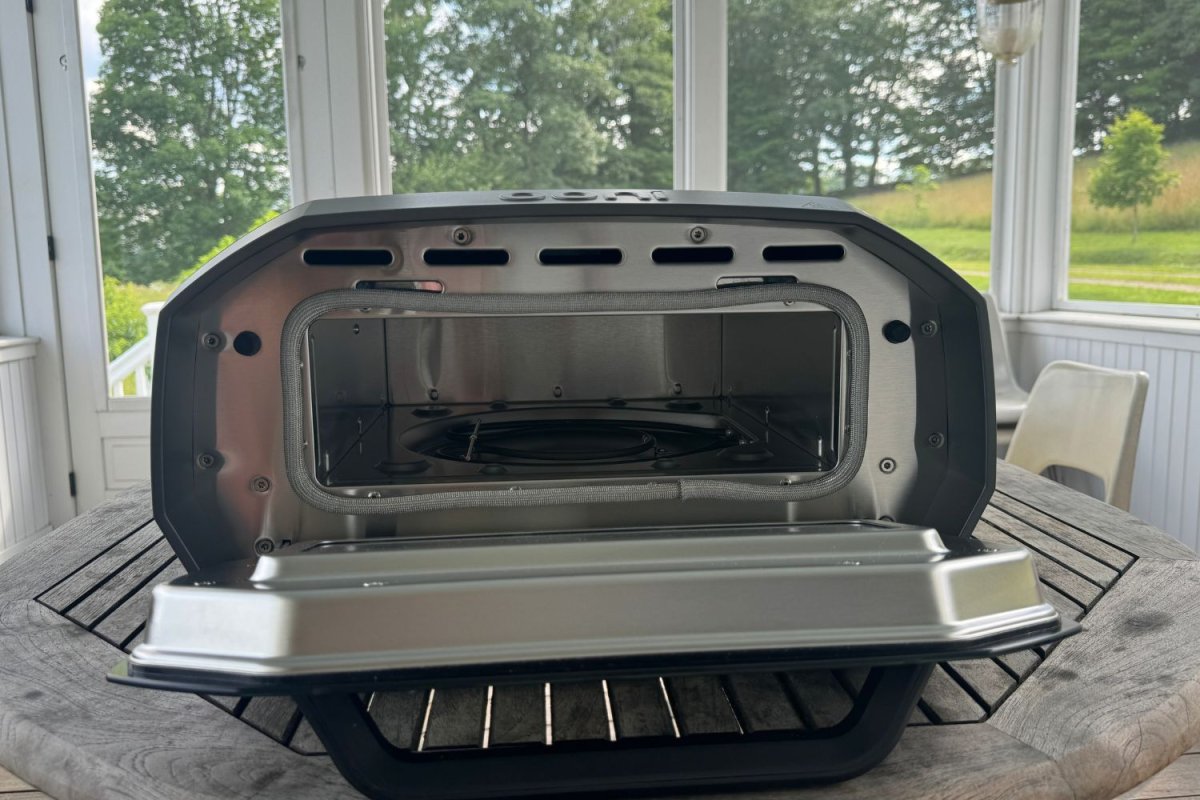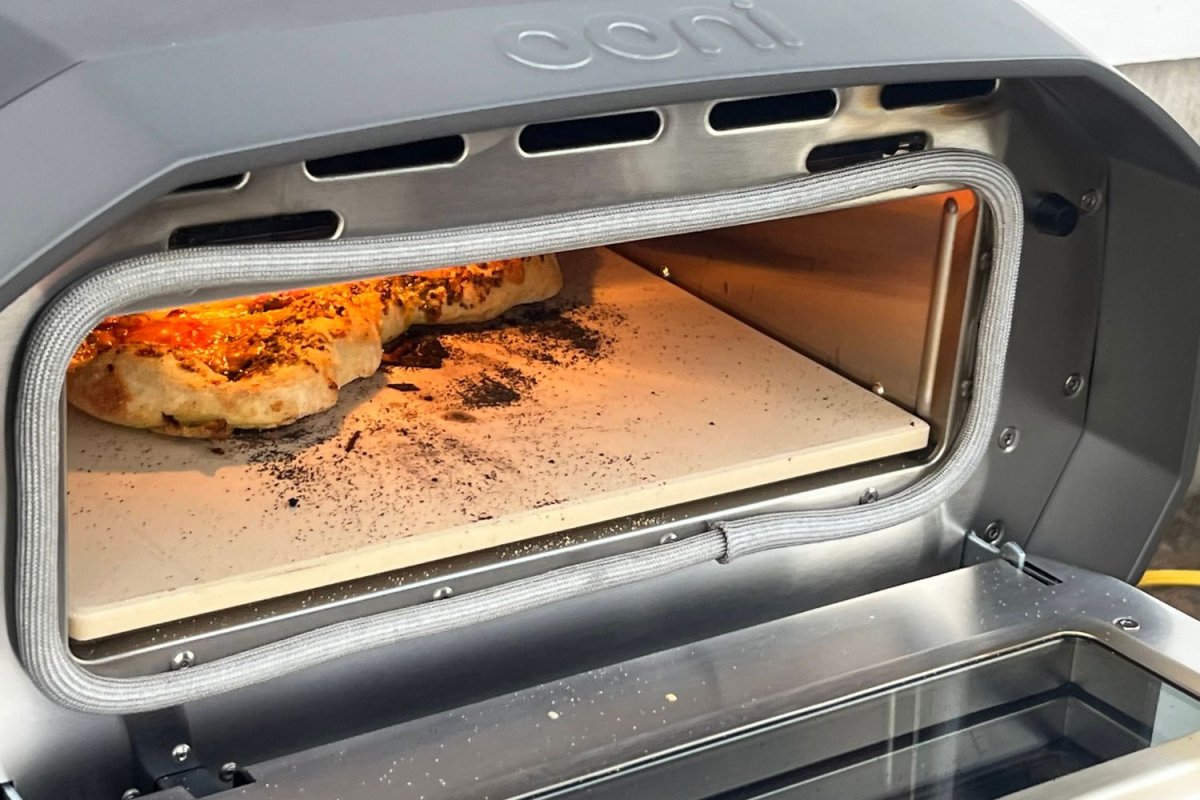We may earn revenue from the products available on this page and participate in affiliate programs. Learn More ›
Ooni is known for making quality outdoor pizza ovens for home cooks who want to bring the restaurant experience to their backyards. In fact, the brand’s Karu 16-inch Multi-Fuel Pizza Oven is our favorite for outdoor use. But the newest addition to the Ooni product line, the Volt, is a fully electric oven that can be used indoors. As an avid pizza maker (and eater), I had to find out if the electric version performed as well as the gas- and wood-fired pizza ovens I’ve used.
I tested the Ooni Volt to see how well it crisped up thin-crust pies, cooked a medium-rare steak, and even roasted vegetables. I used the oven indoors and out and served friends and family dozens of pies to hear their take on the results. I tested the Volt side by side against the gas-powered Ooni Koda 16 to assess the differences in usability and pizza quality. If you’re considering investing in a new electric pizza oven for your kitchen or apartment, here’s everything you need to know about the Ooni Volt.

Ooni Electric Pizza Oven: At a Glance
Our rating: 5/5
| What We Like | What We Didn’t Like | |
| Reaches 850 degrees Fahrenheit in 20 minutes | May be too large for some kitchens | |
| Easy to transport with side handles | Oven door gets very hot during use | |
| Cooks crisp, perfectly blistered pizzas in less than 2 minutes |
Testing the Ooni Volt Pizza Oven
I tested the Ooni Volt on my back patio on several hot summer evenings. I placed the oven on a tile-topped table and prepared over a dozen pies. I compared the electric Ooni to the Ooni Koda 16 Gas-Powered Oven, which is the oven I’ve been using for several years.
Setting up the Ooni Volt
The Ooni Volt arrived in a single cardboard box. At less than 40 pounds, the oven itself is not exceptionally heavy, but the box was bulky and awkward enough that you’ll want two people to help with moving and unboxing.
Once the box was open, it was as simple as pulling out the oven, placing the included pizza stone inside, and plugging it in. Before your first use, the clear instruction manual recommends seasoning the oven by cranking it up to full blast (850 degrees Fahrenheit) for 20 minutes. After that, it’s ready to use.
I used both grocery store-bought dough and homemade pizza crust (using this recipe from Serious Eats) in the oven. I also cooked steak, aiming for a perfect medium rare. I assessed how quickly the appliance reached its target temperature, how well it maintained its heat during use, how quickly and evenly the pizzas cooked, and how easy it was to operate and maneuver inside the oven. I also assessed portability and used the oven indoors in a small New York City apartment.
| Ooni Volt Specs | |
| Dimensions | 10.9 by 24.2 by 20.8 inches |
| Weight | 39.2 pounds |
| Watts | 1600 |
| Cooking area | 13 inches |
| Max temperature | 850 degrees Fahrenheit |
| Difficulty level | Intermediate |
Features
This is a straightforward appliance. Unlike your average countertop oven, it doesn’t come with a long list of fancy features and cooking styles. The Volt does one job—getting very hot very fast—and it does it well. While I was rolling dough and topping my pies, I set the temperature dial to my desired heat—750 degrees Fahrenheit—to let it preheat.
The oven starts at 250 degrees Fahrenheit and can reach 850 degrees Fahrenheit, but if this is your first time cooking in a high-heat oven, I don’t recommend cranking it to the highest setting. A careful start will give you more room for error as you learn to cook and turn the pizza before it burns to a crisp.
The oven takes about 20 minutes to reach the highest temperature, and a “ding” will chime when it’s there. It also has a simple kitchen timer that counts down from 20 minutes (the maximum) to zero. You can mute the chime notifications if you like.
Unlike Ooni’s other gas and wood-fueled ovens, the Volt has a door on the front. This helps trap heat, which makes things more comfortable for the chef, especially if you’re working indoors, and helps the oven maintain its temperature. The door is great for these purposes, but it’s also very easy to bump against the burning-hot glass and metal door while rotating the pizza or retrieving it from the oven. You may want to wear long oven mitts for safety.
The oven’s third dial is for heat balance. Using this, you can switch between the top and bottom heating elements. This came in handy several times during testing when the bottom crust was crisp and cooked through, but I wanted a little more color on the cheese. I switched from bottom heat to top heat and quickly took care of the undercooked toppings. The oven comes with a guide to various pizza styles with recommendations for which heating elements and temperatures to use.
The Volt also has a “boost” feature that helps the pizza stone return to its starting temperature quickly between pies. Otherwise, the stone will continue to get cooler with each new cold crust, and things can start to cook unevenly.
During testing, the Volt produced consistently crisp, well-cooked pizzas with golden melted cheese and lightly blistered—not burned—crusts. Compared to the gas-powered Ooni, the Volt was more consistent and maintained its temperature more reliably during use.

Size
For now, the Ooni Volt comes in one size that can accommodate one 12-inch pizza at a time. For a crowd, you’ll want to make several pies, but for one or two people, a single pizza may be sufficient. The oven has side handles for transport, though it’s fairly bulky and not exactly light.
At just under 40 pounds, you may be able to move the oven on your own, but not very far. It’s also 24 inches wide by 20 inches deep, so it’s awkward to wrap your arms around. If you’re short on kitchen counter space, you may not want to leave the Ooni Volt out at all times. However, it must be stored indoors, so check to ensure you have the storage space for the appliance.
Does the Ooni Volt come with any accessories?
The oven does not come standard with accessories. However, you can order a bundle that includes a peel, an oven cover, and a digital infrared thermometer. You don’t necessarily need the thermometer, but it’s helpful for checking that the pizza stone has regained its peak temperature between pies.
The cover is also optional, especially since the oven still needs to be stored indoors. The peel, however, is a must. You’ll need a 12-inch peel to insert and remove pizzas from the oven. Having several peels will make the pizza process easier if you plan to make more than one or two at a time. A turning peel, which is smaller and designed for rotating the pie as it cooks, will also come in handy.
How easy is the Ooni Volt to use?
However, once you get the hang of how fast pizzas cook and how they need to be rotated for even cooking, things will flow smoothly. Practice makes perfect with pizza ovens, but the even heating of the Ooni Volt compared to other wood- and gas-fired ovens I’ve used makes this one more beginner-friendly.
The oven is about as easy to set up as possible, but cooking in it comes with a slight learning curve. Remember, this oven is superhot, so things cook fast and can burn fast. I recommend first timers not to crank the oven all the way to 850 degrees Fahrenheit because that gives you only a few seconds to react to a singed crust.

Ooni Volt Performance
I was impressed by how quickly this oven reached sky-high temps (beyond what my wall oven would even attempt) and by how well it maintained its heat. The oven consistently performed well over several lengthy pizza-making nights.
Our pies, even when loaded with wet toppings like veggies, came out with crisp, lightly blistered crusts every time. Aside from a few burned edges on my first couple of pizzas, once I got the hang of the superhot oven, I was able to quickly cook pie after pie to feed a hungry crowd.
How do you maintain and care for the Ooni Volt?
The Ooni’s glass door can be cleaned with a dry cloth when it’s completely cool, but the rest of the oven interior shouldn’t require cleaning. It gets so hot that any food will burn right off during use. You can wipe down the oven exterior with a damp cloth when it’s fully cool.
Ooni Warranty
Oooni offers a 1-year warranty on all products. The brand offers an extended 5-year warranty on select models, but as of now, that does not include the Volt.
The Ooni Volt is a High-Performance Oven Worth the Price Tag
If you’re serious about making restaurant-quality pizzas at home that are way better than takeout, the Ooni Volt is worth every penny. The oven’s rapid, even heating and the ability to make pizza at home in any weather make this oven a worthwhile investment for pizza lovers. Plus, it’s not just for pizzas—anyone who likes quick-fired veggies and meat will get plenty of use from this electric oven.
Buy the Ooni volt at:
Product Comparisons
| Halo Pizza Oven See our review. | Solo Stove Pi Fire See our review. | Wisco Industries 421 Pizza Oven See our review. | Gozney Roccbox | Cuisinart Indoor Pizza Oven | |
| Dimensions | 25.5 by 22.5 by 15 inches | 16.9 by 19.3 inches | 18 by 15 by 7.75 inches | 16.3 by 21 by 18.6 inches | 17.5 by 19 by 11 inches |
| Weight | 52.9 pounds | 19.6 pounds | 19 pounds | 44 pounds | 25 pounds |
| Fuel Source | Propane or natural gas | Solo Stove Fire Pit | Electric | Gas or wood | Electric |
| Max Pizza Size | 16 inches | 14 inches | 12 inches | 12 inches | 12 inches |
| Max Temperature | 950 degrees Fahrenheit | 650 degrees Fahrenheit | 500 degrees Fahrenheit | 950 degrees Fahrenheit | 700 degrees Fahrenheit |
| Price | $549.98 | $259.99 | $164.95 | $499 | $199.99 |
So, is the Ooni Volt right for you?
Yes, the Ooni Volt is one of the pricier electric pizza ovens on the market. But its performance and quality stand head and shoulders above appliances made by brands that don’t focus exclusively on making the best pizza ovens.
This oven is designed to produce pies that rival what you’d find in Naples from the comfort of your backyard, balcony, or kitchen. It’s usable all year long and can do more than pizza—we had great success cooking medium-rare steaks and roasted veggies in the oven. If you have the space and don’t mind paying more for a premium product that’s built to last, the Ooni Volt is a worthwhile investment for avid home cooks looking to upgrade their pizza game.
Meet the Tester
Lizzy Briskin is a freelance home and kitchen writer and product tester for Bob Vila and other outlets. She has covered food and home products for over 7 years and has a culinary degree from Cambridge School of Culinary Arts. She’s an avid home pizza maker and has used a variety of backyard and indoor ovens to make all kinds of pies. She values crisp thin-crust pizzas with pillowy air bubbles and plenty of toppings. She carefully considered how well this oven performed with homemade and store-bought dough, plus steaks and sides.

